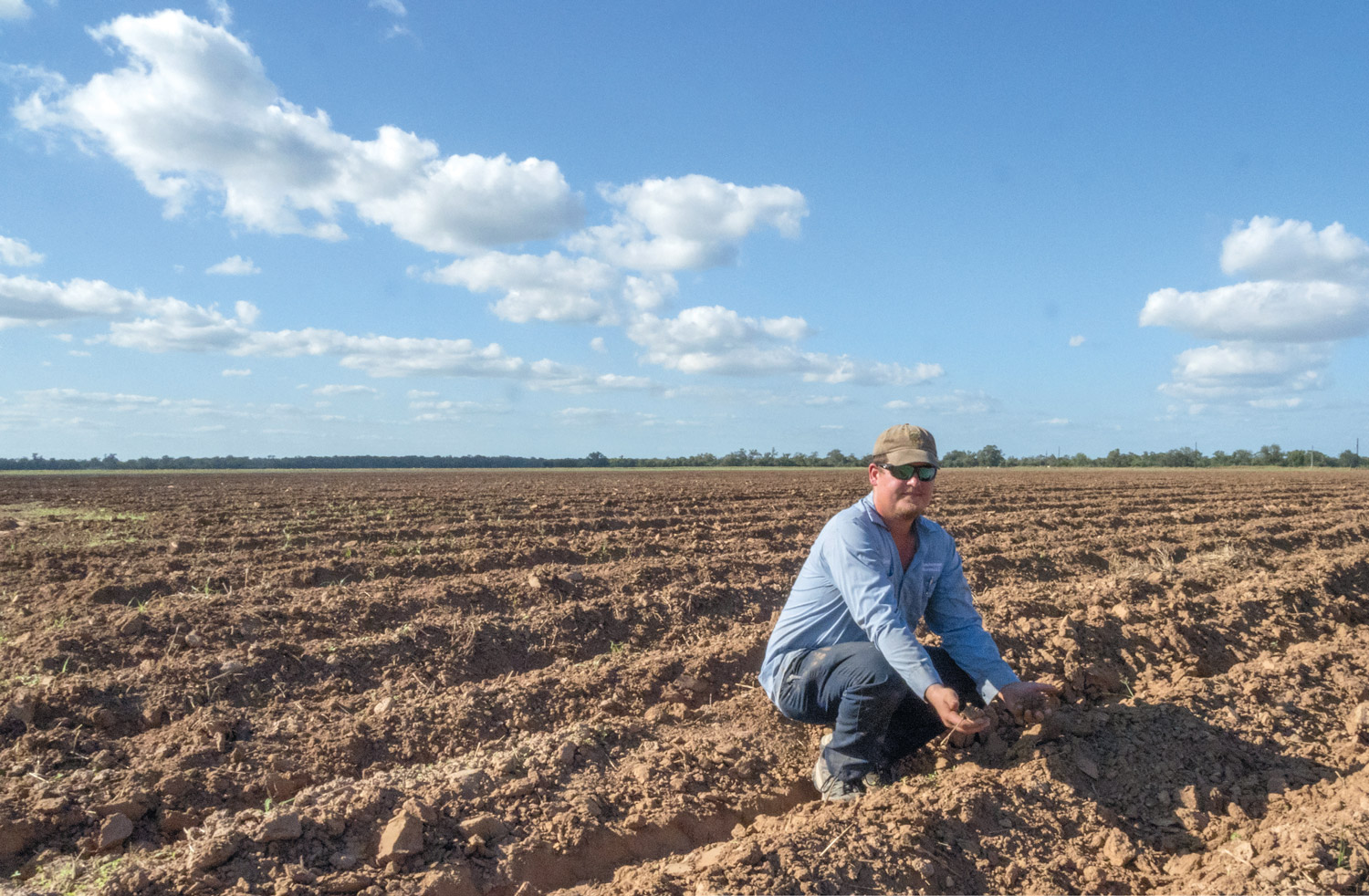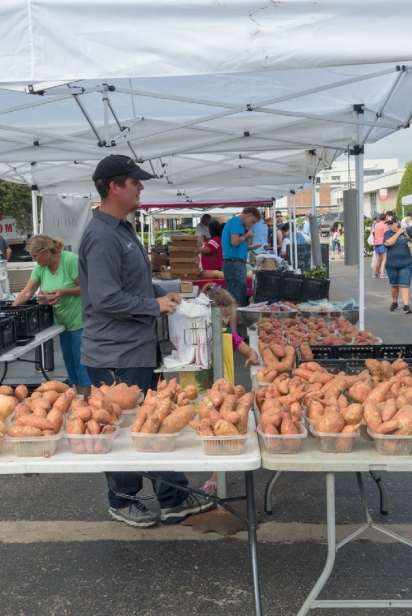Gundermann Farms - Grown from a Peach Orchard
Gundermann Acres: 35 Years of Farming for Houston
Thirty-five years ago, Walter and Dorothy Gundermann opened a peach orchard in Glen Flora, Texas, a tiny town on the east bank of the Colorado River. They had owned a peach orchard before, in East Texas, but were forced to leave their land and relocated to Wharton County, some 60 miles southwest of Houston. There, Dorothy and Walter went back to growing peaches on 90 acres that they named Peachland.
Over the years that peach orchard would evolve into what today is Gundermann Acres, the largest sustainable produce grower near Houston. Garrett Gundermann, Walter and Dorothy’s grandson, runs the now-500-acre farm with his wife, Stacie. With hard work and dedication, the family has been an important presence in Houston’s local food community even as their journey has at times been marked by loss.
In August, Garrett faced his biggest loss yet when Hurricane Harvey dumped more than 20 inches of rain on the farm and caused the Colorado River to overflow, practically turning the farm into a lake and flooding his nearby home. Already, the year before, he had lost a barn and a tractor to a fire and some crops to a hard freeze.
“I know a lot of people who would throw up their hands in the air and give up,” says Garrett, “but this is my livelihood, the way I provide for my family, so I have no choice but to keep grinding it out.”
From peaches to organic produce
That fighting spirit seems to run in the family. After a hard freeze killed a portion of the family’s peach trees in the late 1980s, the Gundermanns adapted by growing some vegetables. In the mid-1990s, Garrett’s parents took over Peachland, renamed it Gundermann Farms and ventured into organic growing.
Joan became interested in organics after hearing that exposure to chemicals could be harmful. Back then organic growing was less known about then it is now, so the Gundermanns were going into new territory. But Joan, a city girl from Houston who knew nothing about farming when she joined her husband in taking over his family’s peach orchards, wasn’t one to shy away from a challenge. Through research and trial and error, she succeeded in taking Gundermann Farms from a conventional peach orchard to one of the first certified organic farms in the state.
“They were doing organic produce before it was cool to do so,” said Patricia Greer, owner of Pat Greer’s Kitchen, a raw vegan café in Houston.
Greer has a long history with the Gundermann family. She and Joan met some 18 years ago when Greer was introduced to the Gundermann’s produce through a share program in the Heights. Greer loved the produce and asked Joan to sell it to her for an organic food cooperative she and her daughter, Jennifer Georgantas, wanted to start. It took some time but in 2001 Central City Co-op was born on Jennifer’s front porch.
As part of the co-op, Greer took groups to tour Gundermann Farms and prepared food for them with produce picked from the farm. For Joan, the tours were a way to show people what she was doing and to make them part of the family.
Central City Co-op is still going and while Greer is no longer involved with it, the Gundermanns continue to sell their produce through it. Joan’s interest in organics wasn’t limited to her farm. Cathy Sullivan of Happy Heart Family Farm in Damon credits her for helping bring a branch of the Texas Organic Growers Association to Houston along with others, including Sullivan and Greer. “She was a big part of that and so generous,” says Sullivan.
Growing and rebuilding
When Joan’s health deteriorated and work on the farm became too demanding, Garrett took over. “She tried to hang on as long as she could but you could tell it was killing her,” he says.
At the time, 10 years ago, Garrett had just earned a degree in radiology but his heart was at the farm. He slowly grew the 100 acres he bought from his parents to the 500-acre farm he owns today and renamed it Gundermann Acres. It wasn’t easy. “He’s young and ambitious but it was a lot of work,” said Joan.
Garrett credits the farm’s growth to his commitment to putting out good-quality produce at reasonable prices. By striving for quality first, he keeps customers coming back.
About one third of Gundermann Acres is certified organic. The rest is grown sustainably but without the official certification, which can be expensive for small farmers. Pre-Harvey, the farm grew 90 crops throughout the year, with at least a dozen crops growing at any given time and about 30 grown during the winter. Because Garrett grows several crops hydroponically in greenhouses, he’s able to offer some produce, such as tomatoes, cucumbers, bell peppers and strawberries, even when it’s not in season.
This sometimes leads to skepticism among market shoppers. Even after the hurricane, some people questioned how he had any produce to sell at all. Garrett explains that he had picked as much as he could before to storm, sold what he could and donated the rest. “There’s always someone questioning what we do,” he says, but he always welcomes the skeptics to go out to the farm and see what he does for themselves. Most never take him up on the offer.
Garrett estimates that he lost about 400 acres of crops to Harvey. The greenhouse covers were damaged, killing the tomatoes and cucumbers; peach trees died; and 40 colonies of bees, which Garrett keeps on the property to pollinate his crops, were lost. He also had to tell 15 of his workers to go look for other jobs, keeping only two on payroll.
“It’s going to be just like 10 years ago, starting from the bottom,” he says. “I’m scared that I’m going to have all this good produce to sell but I’m not going to have help to harvest, but I guess we’ll cross that bridge when we get there.”
While the list of losses is long, the rebuilding began in September as soon as the fields were dry enough to replant. But it takes 150 to 200 days for many crops to be harvest ready so Garrett doesn’t expect to have much income from produce sales until next year. He used to sell at six area farmers markets but for now he’s only going to the Eastside farmers market with what little he has to sell.
Despite the devastating losses, Garrett keeps a positive outlook. When asked if he’s ever considered quitting, he thinks back to when he started farming on his own and a freeze killed his first crop.
“It was like a fork in the road at that point. I could either let it devastate me or keep my chin up, say ‘It’s in God’s hands, it’s going to get better’ and go down that road,” he says. “That’s the last time something truly affected me where I thought ‘I’m going to quit farming.’ I know we’re going to have good times and we’re going to have bad times, but we’ll get through it.”
Exactly as previous generations of Gundermanns have gotten through the tough times and perhaps how Garrett and Stacie’s children, now ages 4 and 1, will do in the future.
Most small farms were affected by Harvey and some, like Gundermann Acres, faced true devastation. Unlike commodity farmers, small farms don’t qualify for crop insurance or government subsidies, leaving them to rebuild on their own. Even farmers not directly affected found themselves at a financial loss when farmers markets closed in the wake of Harvey.
At Cellar Farms in Angleton, Mike Palmer lost both of his vegetable plots. “It finally did us in,” he says of Harvey. Palmer is hopeful that he’ll get a winter crop and will sell his eggs, honey and pickles in the meantime.
Chris Sturdivant of Sturdivant Farms in Alvin lost his entire fall satsuma crop when 40 inches of rain caused the nearby bayou to overflow. His 500 trees survived, but come November Sturdivant will have to throw out all the mandarins he picks because they came into contact with contaminated floodwaters.
In Damon, 50 miles southwest of Houston, Cathy Sullivan of Sullivan’s Happy Heart Family Farm lost 200 of her 350 egg-laying chickens to floodwaters and predators. Harvey also wiped out her vegetable crops and flooded her home. “I went from having an income to no income,” she says. “It was quite devastating.”
Want to help? Continue supporting local growers by subscribing to community-supported agriculture (CSA) harvest subscription programs; shopping at farmers markets and local hubs like Central City Co-Op (centralcityco-op.com) or further afield in Brenham at Home Sweet Farm Market (homesweetfarm.com); and donating to organizations like the Texas Organic Farmers & Gardeners Association and FARFA (farmandranchfreedom.org).






